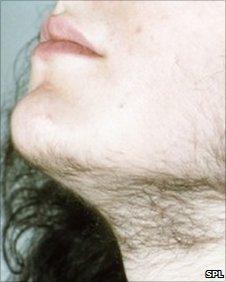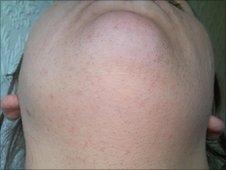'I always have to carry a razor'
- Published

Facial hair can cause psychological misery
Each morning Emma gets up early to shave her face before her partner wakes up.
She shaves every night before she goes to bed and carries a razor in her bag, just in case her stubble starts to show.
For 24-year-old Emma, her unwanted facial hair on her chin, jaw and neck is a real problem.
Not only does she feel it unsightly, she also feels it is destroying her confidence and leaving her feeling unfeminine.
"I have had this problem since I was 19," she said.
"I feel there is a lot of hair.
"I thought it was something just old women got and I thought 'why would someone my age get it?'
"It makes me feel like a man.
"I shave it, but it comes back more and grows coarser."
Destroying confidence
Emma, from Derbyshire knows now that the reason for her excess facial hair is her polycystic ovary syndrome (PCOS) - she was diagnosed last year.
With PCOS, excessive body hair (hirsutism) may develop as a result of increased testosterone levels
But Emma says her unsightly problem is blighting her life.
"It has lowered my self-esteem," she said. "I don't think very highly of myself and my confidence is shot to pieces.
"I don't really go out because I know I need to have a razor in my bag. If you go to a club and they search your bag how do you explain that you have a razor in it?"
Getting help
Gloucestershire-based GP Dr Dawn Harper is one of the experts leading a campaign called 'We Can Face it', which aims to raise awareness of the condition which affects around 40% of women.
And she urged women like Emma to seek help and ask about treatment options, which range from laser treatments, creams and pills to shaving and plucking.

Emma shaves several times a day
"We are all guilty of underestimating the impact, myself included," she said.
"We all realise the physical impact, but when we dig a bit deeper it is quite heart wrenching to hear the stories.
"There is a hidden cost in terms of the emotional cost to women of unwanted facial hair."
'We can Face it' surveyed 1,000 women with excess hair problems and found most were isolated, with more than half saying that they felt uncomfortable even talking to their family.
And the majority said they are not seeking professional help from their doctor, saying that they do no want to waste the GP's time; that they feel embarrassed or are concerned they will not be taken seriously.
Dr Alexandra Mizara, a counselling psychologist and specialist in psychodermatology at the Royal Free Hospital London, said the women were suffering "appalling psychological damage".
"There is a lot of impact on these women.
"They have low social confidence and this impacts on their work and social situations.
"They might also have social anxiety and negative views about themselves and how desirable and loveable they are.
"They don't often speak about their problem and feel quite isolated.
"Whatever deviates from the norm is seen as abnormal and very different and therefore unacceptable."
Charlotte Footman, electrologist advisor at St Mary's Hospital London, said women like Emma were too often overlooked.
"Working so closely with patients who suffer the embarrassment and misery associated with excessive facial hair growth, I have long been frustrated that there is so little information, medical help or support for these women.
"So many women suffer loss of confidence and self-esteem and are left alone to cope with the physical and psychological effects of living with excess and unwanted facial hair growth.
'I needed help'
Emma said when she went for help she felt her GP was less than sympathetic.
"He made me feel like a bit of a freak," she said.
She is so embarrassed about the problem that, apart from her GP, she has only ever confided in her boyfriend and mother.
She said she had felt totally alone. "Nobody has ever offered me help."